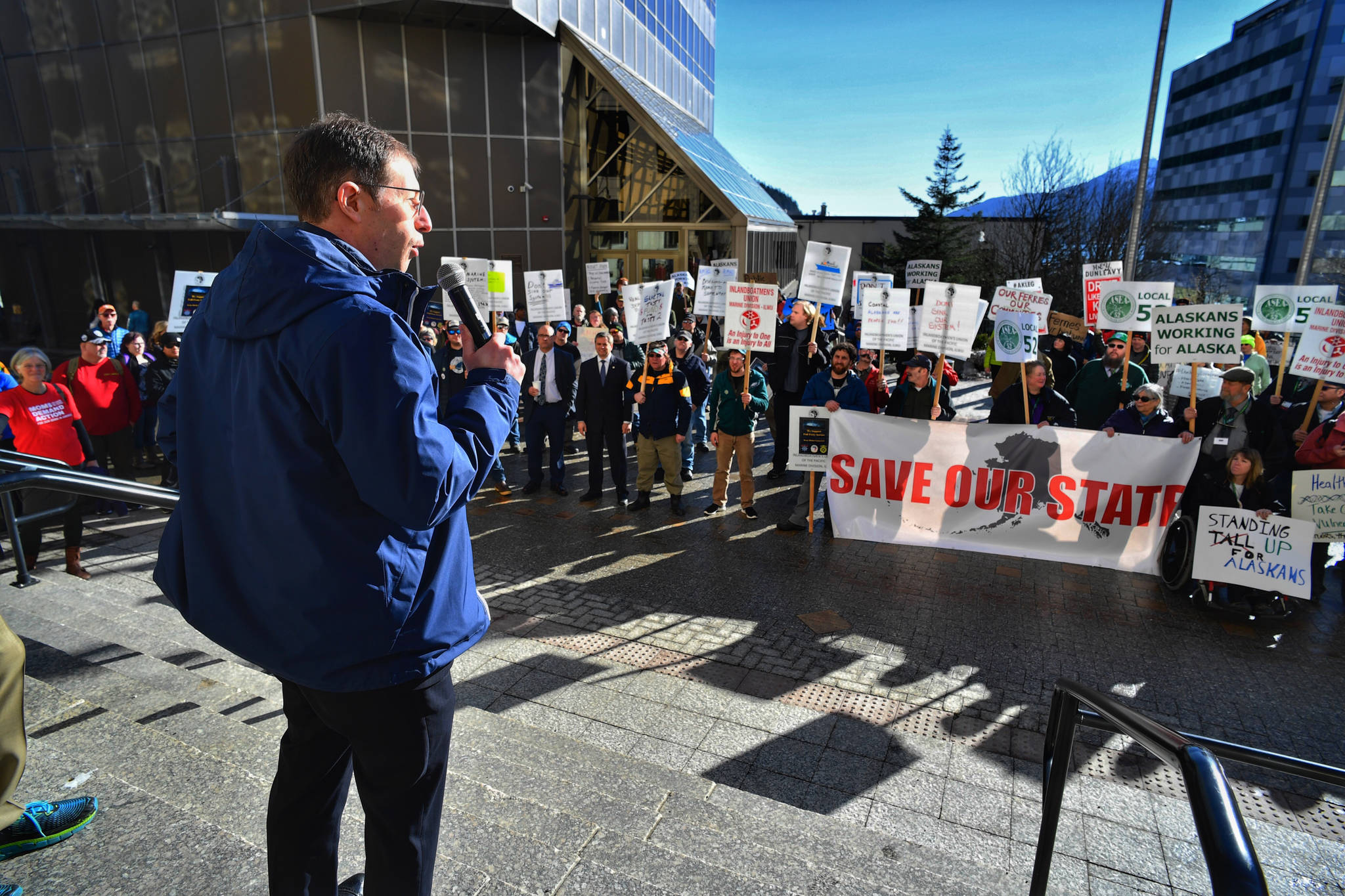Correction: An earlier version of this article used an incorrect word. It’s vans of fish, not bands of fish. The correction has been updated.
Senate Democrats did not mince words with their disapproval of Gov. Mike Dunleavy’s proposed budget at a press conference Thursday, saying if it were enacted it would drive the state backward.
“Don’t tell me your values, show me your budget, and I’ll tell you your values,” said Sen. Tom Begich, D-Anchorage. “That’s what we’ve got. It rings true with Governor Dunleavy for sure.”
The governor has proposed cutting the budget to make up for the $1.6 billion deficit, rather than using some of the earnings reserve money from the Permanent Fund or implementing any new taxes.
In an interview with the Empire earlier this week, Dunleavy said, “I think if we start going down the road of taxing or taking money out of the pockets of Alaskans, we’ll see more of an exodus out of the state. New York, New Jersey, Illinois, California, Connecticut — there was a report this morning that says that’s exactly what’s happening in those states. There’s an exodus of individuals that are part of the tax base that make money, and they are leaving those states, net out-migration.”
But Begich said he was “stunned by how uninformed” the governor seemed about his budget-making process regarding his comments in his interview with the Empire, considering Dunleavy used to be on the Senate Finance committee.
Sen. Elvi Gray-Jackson, D-Anchorage, said the governor’s budget is “simply a travesty” and that it was “unfortunate no one did their homework” before presenting their budget.
“This governor sat on the finance committee virtually every year he sat in this body,” Begich said. “To have such a clear disconnect between the process of budget writing, which he engaged in all those years on Senate Finance committee in the majority for the most part, to looking at this budget which seems to be disconnected that (Legislative Finance Director) David Teal identified. This disconnect between policy and budget. To think you can simply talk numbers and not talk about what those numbers do, what the impact of those numbers would be on average Alaskans is, I think, an abrogation of your responsibility and duty as the governor of the state of Alaska.”
Gray-Jackson held the same view that Teal did in his presentation on the budget on Tuesday. The non-partisan Legislative Finance director said most of the budget-balancing in the governor’s proposed budget is done by shifting cost burdens to local municipalities through taxes.
“What the governor’s doing is not solving Alaska’s fiscal crisis, he’s shifting the burden to local municipalities,” Gray-Jackson said, noting that Anchorage would have to raise property taxes by hundreds of dollars to make up for the losses to education funding.
Juneau’s Senator Jesse Kiehl said the governor’s proposal would decimate education, badly harm the university and that he thinks it’s a recipe for disaster. He said he’s been talking with people in Southeast Alaska about the proposed 75 percent cut to the ferry system, and that it’s essential to the area.
“As you look throughout coastal Alaska, you see vans of fish, you see building materials, we could go on and on,” Kiehl said. “You’re not going to have a modern economy without the infrastructure that moves commerce.”
“It’s one Alaska, you can’t break the economy in one portion of the state and expect everybody else to be OK,” he said.
Kiehl said the Southeast Conference is working on a structure to help the Alaska Marine Highway System operate more efficiently, but you can’t simply stop taking reservations after next fall and expect the ferry system to survive.
Begich said the ferry system is essentially a toll road, which produces revenue, which you can’t say for the asphalt highways in the other areas of Alaska.
“As one of my colleagues has said (the budget) declares war on kids, declares war on rural Alaska, and war on seniors,” Begich said.
• Contact reporter Mollie Barnes at mbarnes@juneauempire.com or 523-2228.

